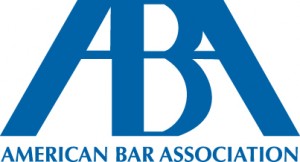Indiana Virtual Law Complies with ABA Guidelines
 Not every law–related website follows the best practices and guidelines established by the American Bar Association. Our website does. Indiana Virtual Law has been carefully designed by the attorneys at Griffith Law Group to comply with two separate sets of guidelines recommended by the American Bar Association, except in regard to a couple matters where our Rules of Professional Conduct require something different of us.
Not every law–related website follows the best practices and guidelines established by the American Bar Association. Our website does. Indiana Virtual Law has been carefully designed by the attorneys at Griffith Law Group to comply with two separate sets of guidelines recommended by the American Bar Association, except in regard to a couple matters where our Rules of Professional Conduct require something different of us.
Essentially, there are two types of law-related websites and, therefore, two different sets of guidelines crafted by the eLawyering Task Force of the ABA Law Practice Management Section and the ABA Standing Committee on the Delivery of Legal Services-
- Best Practice Guidelines for Legal Information Web Site Providers
- Best Practice Guidelines for Legal Document Service Providers
Some law-related websites merely provide information on the law. While other websites provide legal documents and services. And some websites, such as Indiana Virtual Law, provide both information about the law, as well as legal documents and services.
Best Practice Guidelines for Legal Information Web Site Providers
Because there has been a proliferation of websites that provide legal information and because those sites are published by a range of government departments, non-profit community organizations, private companies, educational institutions, individuals, and law firms, it is often difficult to determine which sites are reliable and trustworthy, and which should be avoided. Also, the ABA recognized that users of these websites have varying levels of knowledge of the law and experience using the web to retrieve information.
Thus, the eLawyering Task Force thought it was important to establish standards that would enable the public to determine whether to trust a website or seek law-related information elsewhere. These Guidelines are intended to influence legal web site providers to give users sufficient information to assess the accuracy and the quality of the legal information that is published on a particular website.
We encourage you to read the Guidelines on the ABA website.
Best Practice Guidelines for Legal Document Service Providers
The second set of ABA guidelines establish practices that are recommended for individuals and entities that – outside of a lawyer-client relationship – provide materials and services online for the creation of documents with legal significance. That means legal documents that are intended to express or affect legal rights, obligations, claims, or positions. We simply calls these “legal documents.” This second set of guidelines supplements the Best Practice Guidelines for Legal Information Web Site Providers.
You should note that this second set of Guidelines does not apply to lawyer-client relationships. Because Griffith Law Group is an Indiana law firm and only provides legal documents and services as part of a lawyer-client relationship, we cannot and do not follow each of the ABA’s Guidelines. Three of the 12 ABA Guidelines are inappropriate for a Virtual Law Office, and we do not follow those three. We do strive to follow this second second of guidelines as best we can without violating a higher code of conduct that we follow- the Indiana Rules of Court, Rules of Professional Conduct.
Griffith Law Group adheres to these nine specific Best Practices from the 12 contained in the ABA Guidelines-
Best Practices
1. Providers should know and obey applicable laws and regulations.
Comment: Providers of legal document services should make it their business to know and follow laws and regulations that apply to their operations, Including rules on unauthorized practice of law, fair trade practices, and copyright.
2. Providers should alert consumers that to accomplish intended goals and avoid unintended consequences, legal documents should reflect current law and the goals and circumstances of the parties involved.
Comment: This can be accomplished by a general alert that documents can be ineffective and possibly counterproductive if not reviewed in light of current law in the applicable jurisdiction(s) and the parties’ goals and circumstances.
3. Providers should disclose whether or not their materials have been reviewed for completeness and consistency.
Comment: Those who supply documents to people with legal needs, for fee or for free, should be clear about what they’re providing and not providing.
4. Providers should disclose the extent to which anything is being claimed about the quality and appropriateness of the materials.
Comment: If no such claims are intended, the provider should affirmatively say so. Claims on web pages should be consistent with warranty limitations and other aspects of the site’s more formal Terms and Conditions.
5. Providers should disclose whether a document involves any special formalities or filing requirements.
Comment: If a document needs to be witnessed or notarized, for instance, that information should be provided.
6. Providers should disclose whether the personal information they gather from consumers will be held in confidence.
Comment: This should include a description of the provider’s policies with regard to governmental requests for access to customer information.
7. To the extent a provider assembles or otherwise composes documents for particular circumstances, it should describe the general processes through which that happens.
Comment: The provider should explain in general what machine and human processes are used to prepare the customized document(s) the consumer will receive.
8. Providers should disclose whether or not they assume any responsibility for harm the consumer may experience due to material being inappropriate or incomplete.
Comment: Providers should clearly indicate what if any remedies an aggrieved consumer has if a document that is provided is found to be invalid, not accepted by a court, or otherwise fails to accomplish the intended purpose.
9. Providers should supply links to materials that help consumers understand issues and make educated choices.
Related Posts
Law Library
- Business (4)
- Estate Plan (5)
- Law Library (3)
- News (5)
- Other Topics (3)
- Real Estate (5)
- Trademarks (1)
- Virtual Law (6)





